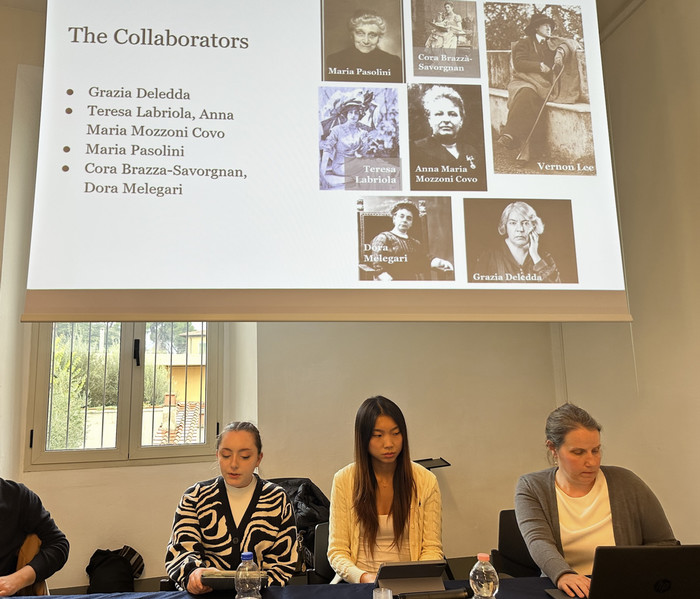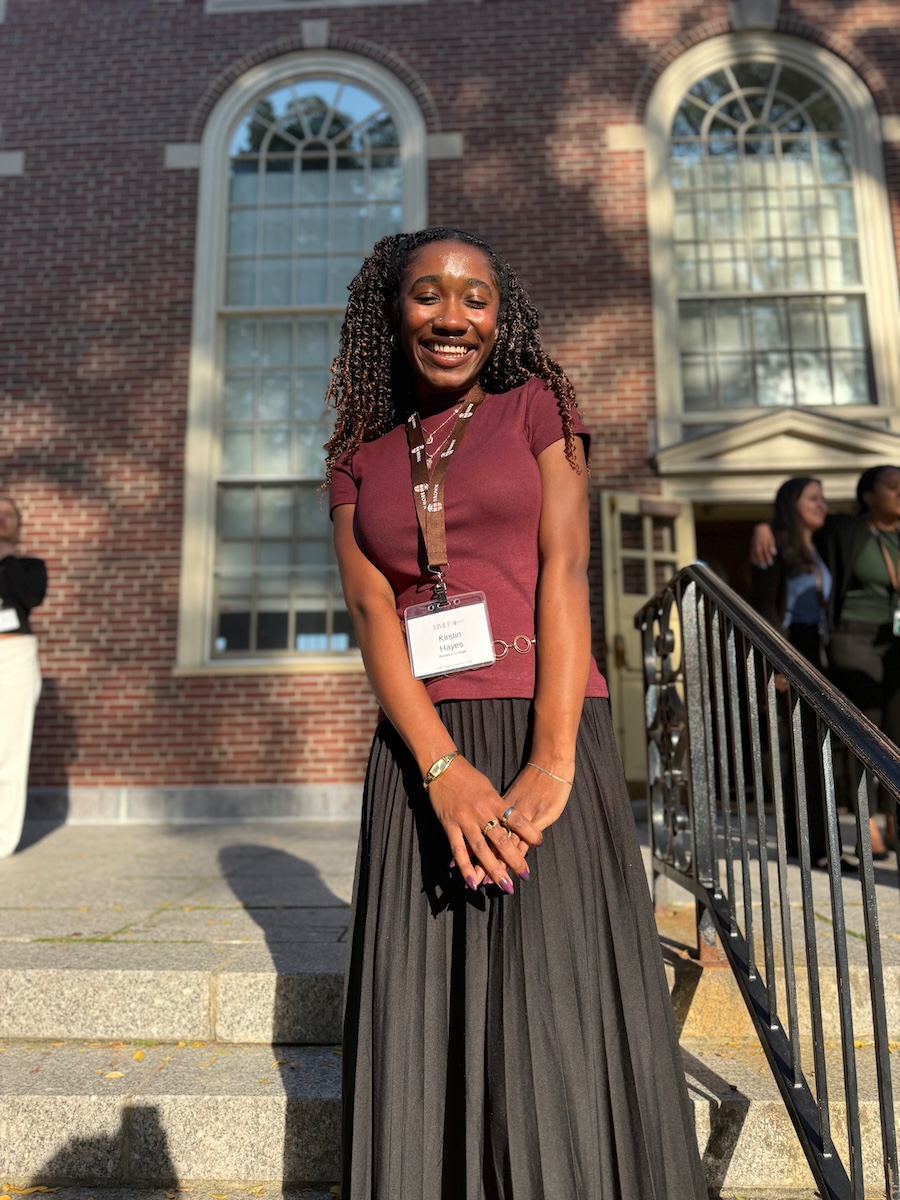Students' New Podcast 'Decodes Politics' to Encourage Civic Engagement
By Rebecca GoldfineA soon-to-be-released podcast by two Bowdoin students aims to illuminate how elections work in Maine by talking to political insiders (including US Senator Angus King and former US Secretary of Defense Bill Cohen).
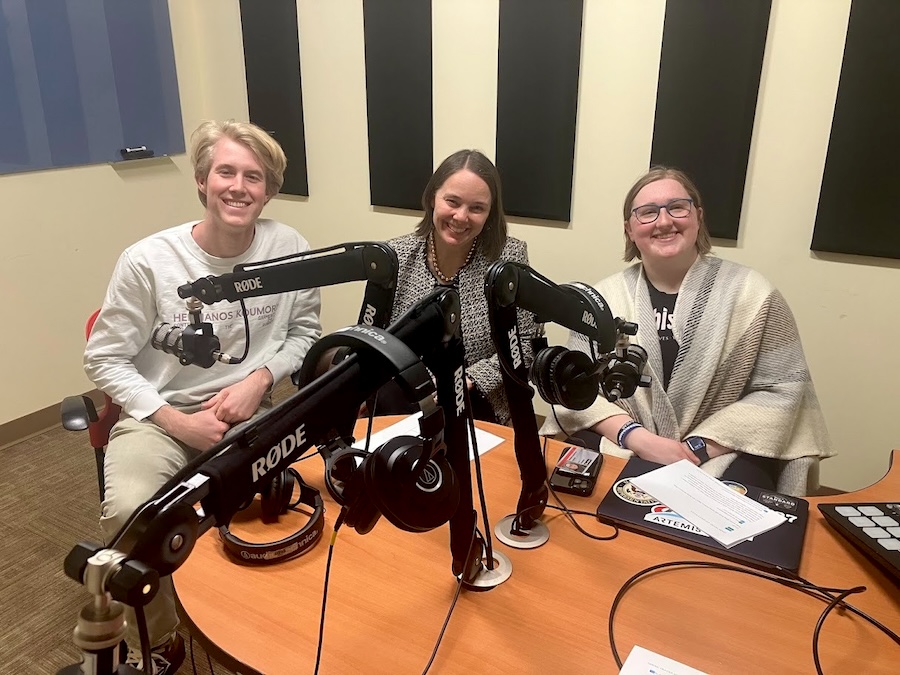
The idea for a nuts-and-bolts podcast about the political process first came to Natalie Emmerson ’27 last year, when she was helping on King’s reelection campaign. One of her tasks was to collect signatures for his ballot petition, per Maine’s law.
Many of the people Emmerson approached on the sidewalk with her friendly request responded with a bit of confusion. Why, they asked her, does a seasoned incumbent like King need to collect signatures to be on the ballot? This would launch Emmerson, who is fascinated with the mechanics of politics, into an explanation of Maine election law.
“I loved it!” the government major said. But the best part wasn’t that she got to share from her trove of political facts. “What was neat was that even if people were like, ‘Eww Angus King’—though I didn’t get many of those—we could still have a discussion about the ballot process. We left the candidate in the background, and we’d bond over the system.”
“The purpose of the podcast is, one, to bridge the partisan divide over a love of the process. And two, to break down barriers of accessibility to voting.” — Natalie Emmerson ’27“
But she also questioned why so many people didn’t know more about the rules and norms of running for office. “I saw that the process wasn’t accessible,” she said. “But if this is how our system of government is run, this information should be accessible.” So, she came up with the idea for a non-partisan political podcast—one aimed at high school and college students, and one she hopes can contribute to strengthening the democracy.
“The purpose of the podcast is, one, to bridge the partisan divide over a love of the process. And two, to break down barriers of accessibility to voting,” she said.
She asked her friend and fellow King campaign volunteer Larsen Van Horn ’27 whether he would join her. “He had by far been one of the most consistent and genuine people on the campaign, and I knew this was someone I would love to work with,” Emmerson said. “It takes a crazy and wonderful person to say yes to this blob of ideas I came to him with.”
Van Horn, who is also a government major, said that coming from Oklahoma, he “was very interested in learning more about Maine government and how it compared” to his home state, adding that taking the class Campaigns and Elections last year had also stirred his curiosity about the subject.
After a semester working on the podcast, he has come away with a deepened respect for the state. “I think our project shows Mainers that their government is unique and impressive in so many different ways,” he said. “Ranked choice voting and clean elections funding are just a few examples.”
“I think our project shows Mainers that their government is unique and impressive in so many different ways. Ranked choice voting and clean elections funding are just a few examples.” — Larsen Van Horn ’27
Pine State Politics, coming to your podcast platform May 7
The Pine State Politics podcast consists of eight episodes. Four will be released May 7—the date of Emmerson and Van Horn’s Podcast launch party at the McKeen Center—and the rest will come out May 17.
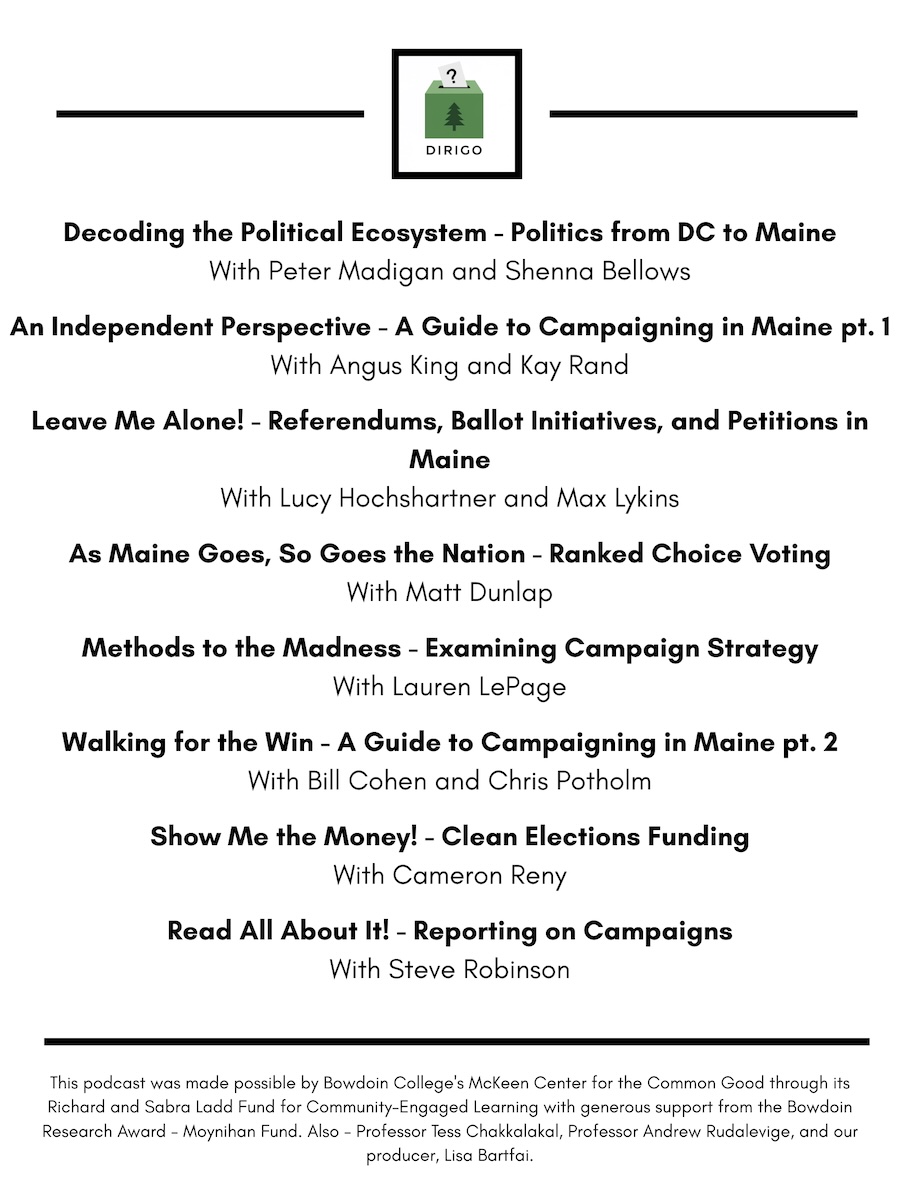
The episodes cover general political topics—campaign strategy, how to run a campaign, and how reporters cover political campaigns, as well as ones more unique to Maine: clean elections funding, referendums, the petition process, and ranked choice voting.
Emmerson said most of the people she and Van Horn invited to participate agreed. Many were also amenable to traveling to Bowdoin to conduct the interview in the College’s recording studio.
The guest list includes names known to most Mainers: Maine Secretary of State Shenna Bellows, Lauren LePage (former Republican Governor Paul LePage’s daughter), Maine State Auditor Matt Dunlap, and Steve Robinson ’11, the editor-in-chief of the right-leaning news service The Maine Wire.
Dunlap provided donuts to Emmerson and Van Horn when they visited his office in Augusta. The Secretary of State's office posted a photo on Facebook of Bellows being interviewed by the podcasters with the caption, “We look forward to listening when the show airs later this spring!”
The Pine State Politics podcast took hundreds of hours to put together—which was only doable because Emmerson and Van Horn got approval to work on it as an independent study this semester.
To pay for a professional audio producer, they also received $4,500 in funding from the College through a research award from the Office of Student Fellowships and a grant from the Richard ’62 and Sabra Ladd Fund for Community-Engaged Learning, via the McKeen Center.
They collaborated with audio producer Lisa Bartfai, who has worked on the College’s official podcast, Bowdoin Presents, as well as the Dead Writers podcast by professors Tess Chakkalakal and Brock Clarke.
As Bartfai worked on the series with the students, she taught Emmerson and Van Horn the basics of her work: recording, editing, and interviewing. The two have also been advised by Bowdoin trustee Katie Benner ’99, a reporter for The New York Times, and Bowdoin professors Chakkalakal and Andrew Rudalevige.
To prepare for each episode, the students began by sketching out a script with questions. “We would sit down and ask, what do we want to know about the guest? What is the story we want to tell? What is the topic we want to learn about through this story? And what is their involvement in the story?” Emmerson explained.
“My favorite part about making the podcast was learning from Maine State Auditor Matt Dunlap that the history of ranked choice voting in Maine dates back to Joshua Chamberlain (Class of 1852) and the Greenback party!” — Larsen Van Horn.
Though Emmerson said she enjoyed all the interviews, she was particularly positive about her conversations with Robinson, of the Maine Wire, and LePage, who runs a public affairs and lobbying firm and was her father’s former campaign staffer. Both lean toward the right side of the political spectrum.
“They were so open,” Emmerson said. “They were also incredibly kind, and both offered, after the interview, that if we ever want to do more media outreach to conservative circles in Maine, they’d help set that up.”
Van Horn, too, said he also was struck by the cordiality of Mainers. “Today, politics in DC is incredibly divided, and I watch politicians criticize and attack other politicians daily. However, our guests all had respect toward each other and had strong things to say about Maine and its people—and our guests in general came from a wide range of political views.”
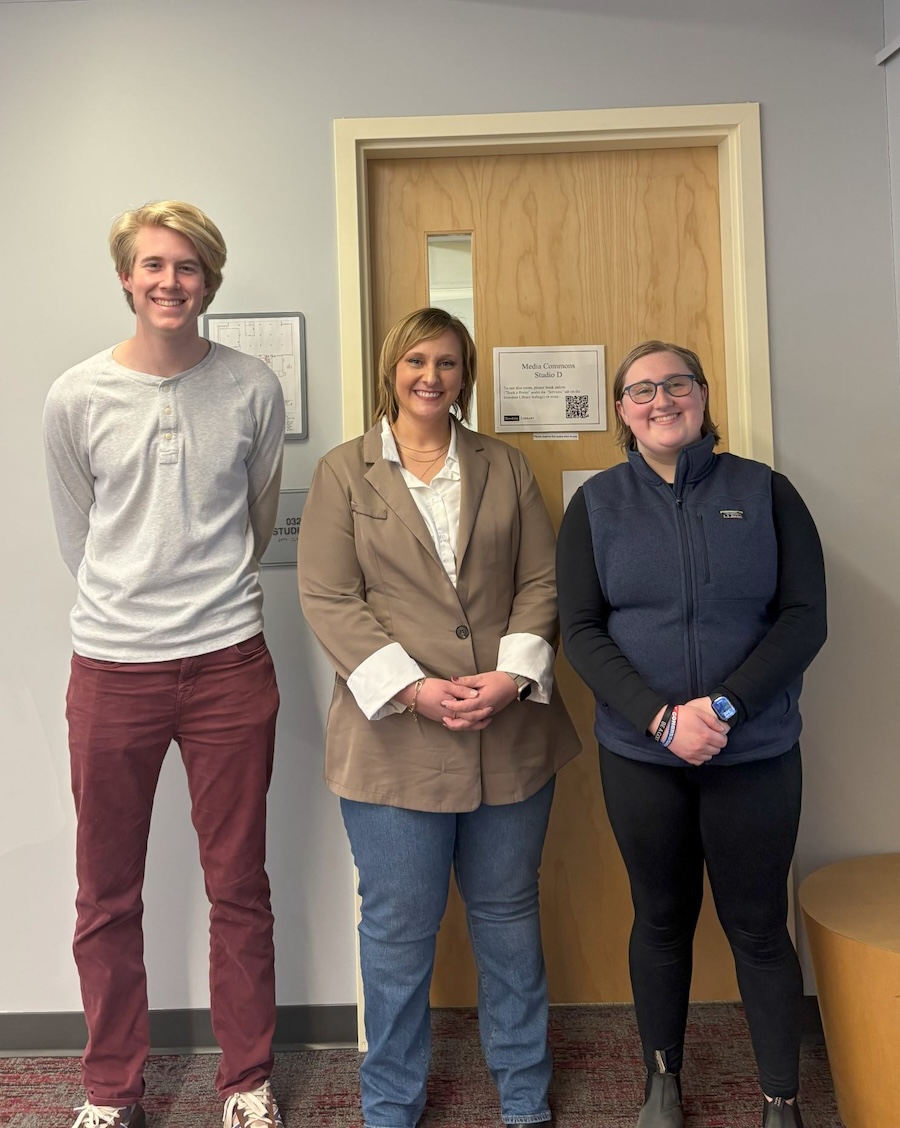
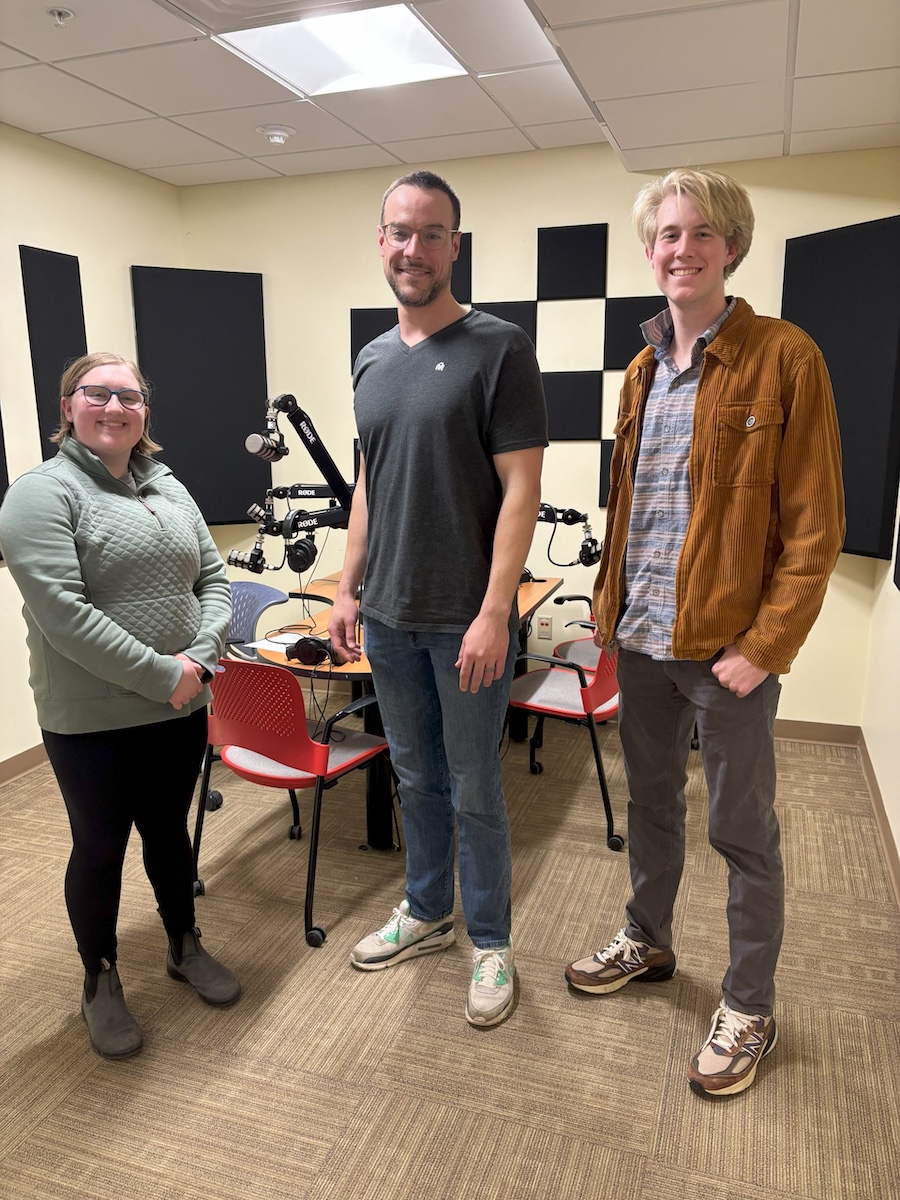
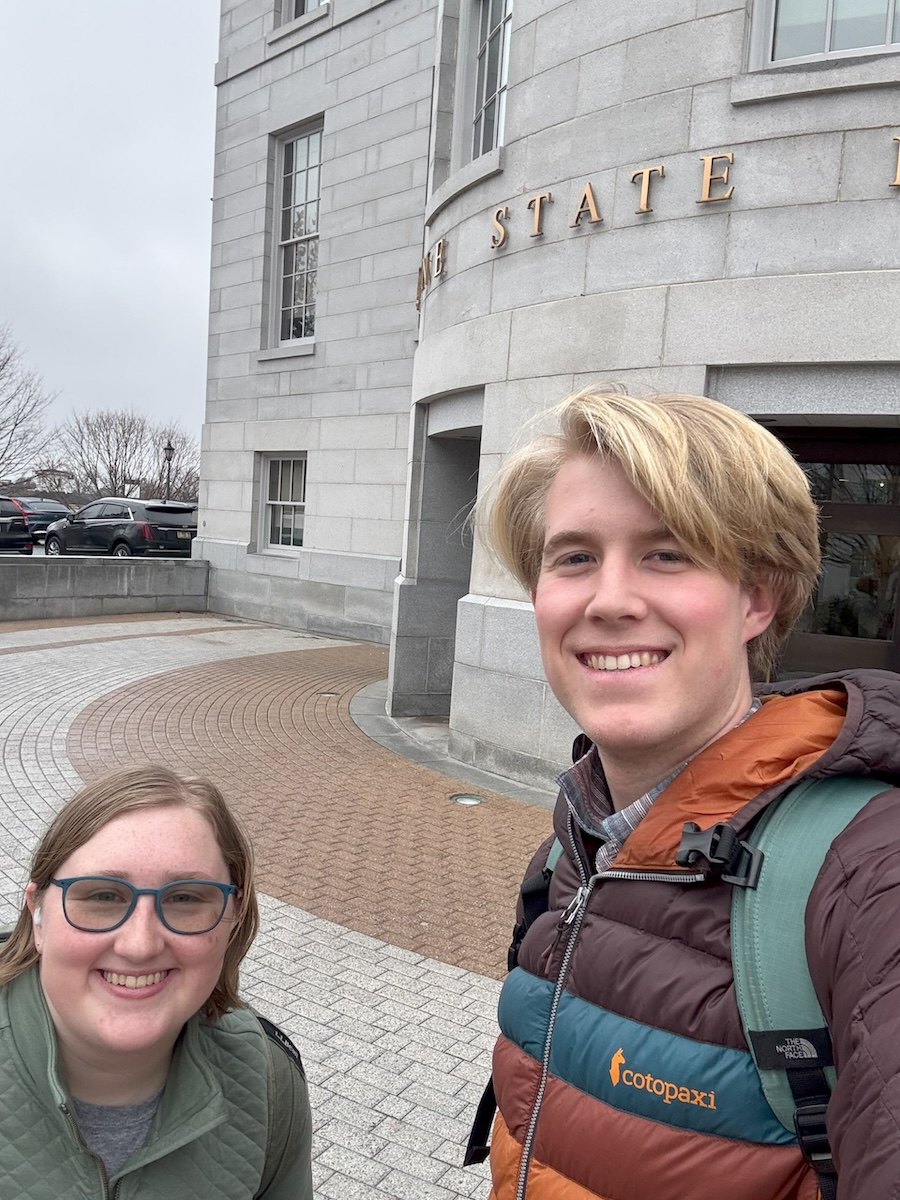
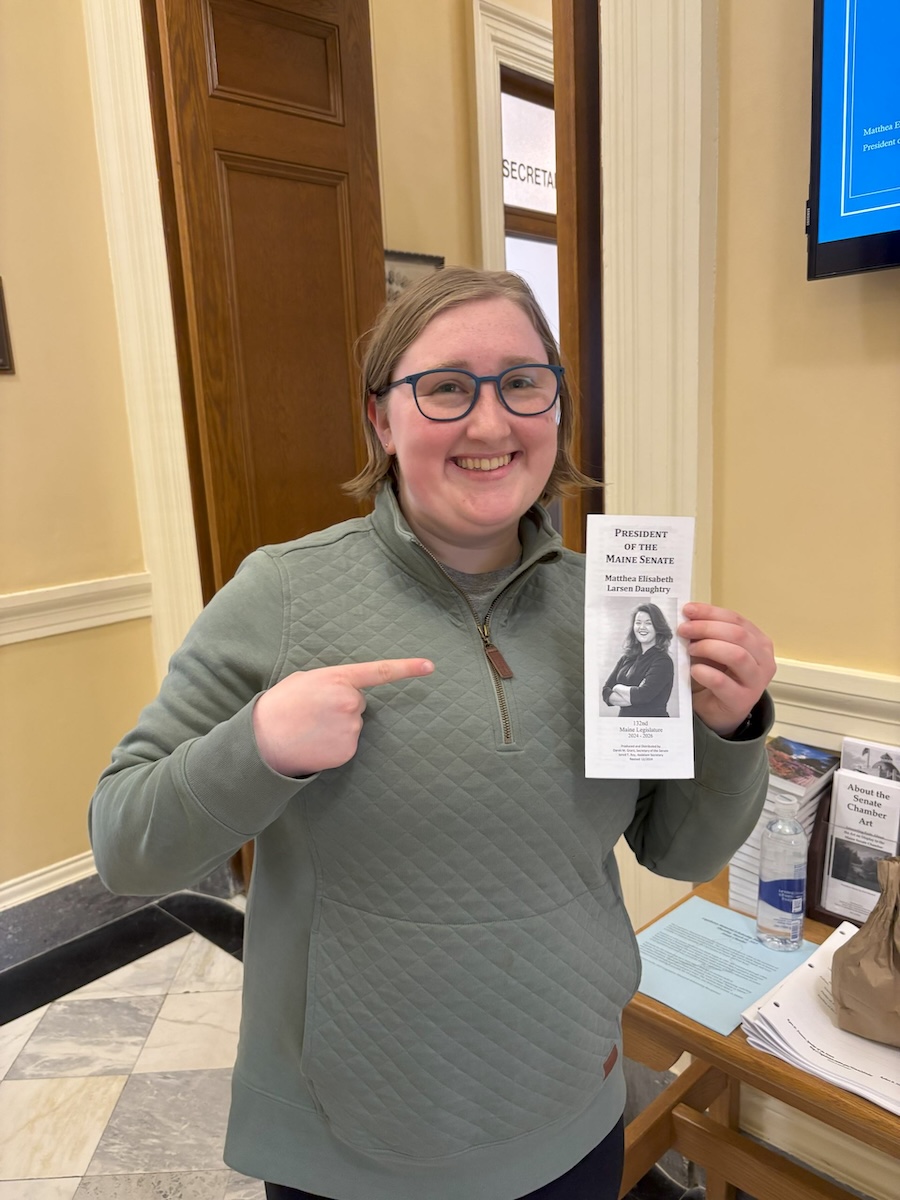
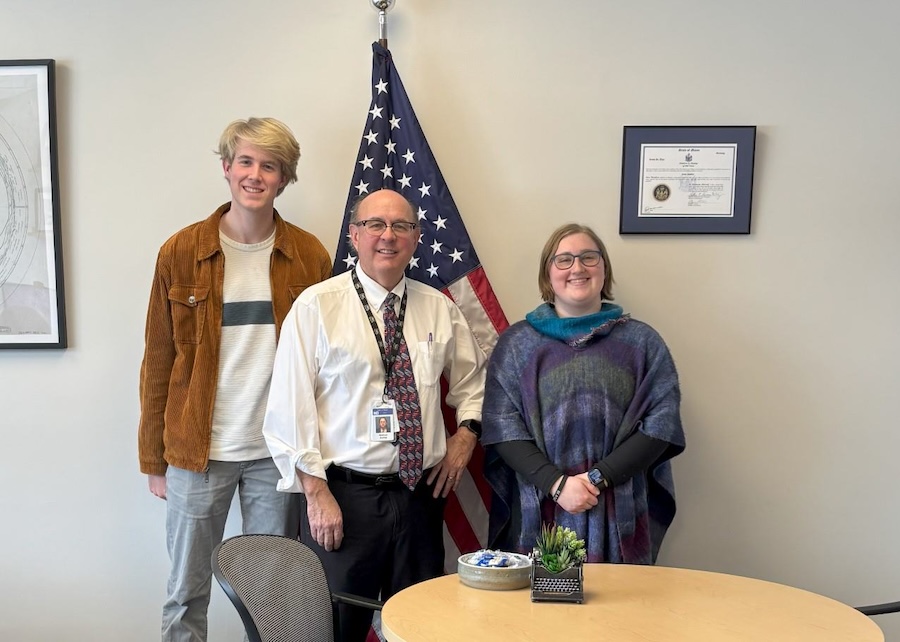
Targeting a younger demographic
Emmerson, who is nineteen and grew up in Maine, noted that she has lived through a fair amount of monumental history already. President Trump was first elected to office when she was eleven. The pandemic happened when she was fourteen, as did the insurrection on Capitol Hill.
“And everything that is happening now, well, the world has blown up as we’ve grown up,” she said.
In August, Emmerson and Van Horn plan to attend the Maine Department of Education's annual summit for educators to talk to teachers about rolling out the podcast as a curriculum tool. The students are also working with a civic education state task force to come up with lesson plans, question sheets, and other ways the podcast can be used in the classroom.
Meanwhile, kids and young people are soaking in all the upheaval. “We’re hearing all these people say that our systems and institutions are imploding, but we don’t actually know what these systems are! Everyone reveres the Constitution, but we’re like, why?”
And, she noted, contrary to the common perception that young people aren’t interested in service or don’t care about politics, she believes that most care a lot, especially about the country and its future. They just could benefit from more information about how the country is run.
“We wanted to create this podcast partially to reduce that barrier of accessibility by explaining how the system works. When you increase civic education, it becomes a lot more approachable,” she said.
Otherwise, she continued, young people who might be inclined to participate might not know where to begin, how to get involved, or who to reach out to. So they give up.
“So we’re trying to create an avenue to empower people to be more involved in the civic process, regardless of party,” she said.

